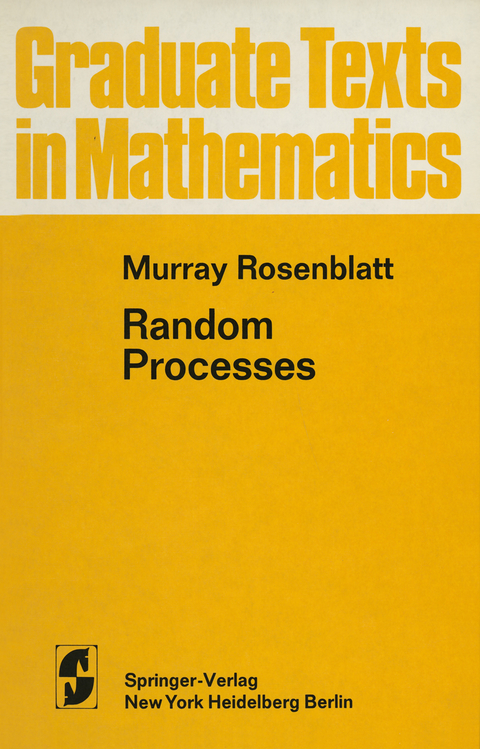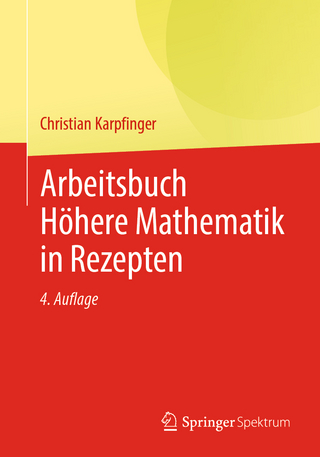
Random Processes
Springer-Verlag New York Inc.
978-1-4612-9854-0 (ISBN)
This text has as its object an introduction to elements of the theory of random processes. Strictly speaking, only a good background in the topics usually associated with a course in Advanced Calculus (see, for example, the text of Apostol [1]) and the elements of matrix algebra is required although additional background is always helpful. N onethe less a strong effort has been made to keep the required background on the level specified above. This means that a course based on this book would be appropriate for a beginning graduate student or an advanced undergraduate. Previous knowledge of probability theory is not required since the discussion starts with the basic notions of probability theory. Chapters II and III are concerned with discrete probability spaces and elements of the theory of Markov chains respectively. These two chapters thus deal with probability theory for finite or countable models. The object is to present some of the basic ideas and problems of the theory in a discrete context where difficulties of heavy technique and detailed measure theoretic discussions do not obscure the ideas and problems.
I. Introduction.- II. Basic Notions for Finite and Denumerable State Models.- a. Events and Probabilities of Events.- b. Conditional Probability, Independence, and Random Variables.- c. The Binomial and Poisson Distributions.- d. Expectation and Variance of Random Variables (Moments).- e. The Weak Law of Large Numbers and the Central Limit Theorem.- f. Entropy of an Experiment.- g. Problems.- III. Markov Chains.- a. The Markov Assumption.- b. Matrices with Non-negative Elements (Approach of Perron-Frobenius).- c. Limit Properties for Markov Chains.- d. Functions of a Markov Chain.- e. Problems.- IV. Probability Spaces with an Infinite Number of Sample Points.- a. Discussion of Basic Concepts.- b. Distribution Functions and Their Transforms.- c. Derivatives of Measures and Conditional Probabilities.- d. Random Processes.- e. Problems.- V. Stationary Processes.- a. Definition.- b. The Ergodic Theorem and Stationary Processes.- c. Convergence of Conditional Probabilities.- d. MacMillan’s Theorem.- e. Problems.- VI. Markov Processes.- a. Definition.- b. Jump Processes with Continuous Time.- c. Diffusion Processes.- d. A Refined Model of Brownian Motion.- e. Pathological Jump Processes.- f. Problems.- VII. Weakly Stationary Processes and Random Harmonic Analysis.- a. Definition.- b. Harmonic Representation of a Stationary Process and Random Integrals.- c. The Linear Prediction Problem and Autoregressive Schemes.- d. Spectral Estimates for Normal Processes.- e. Problems.- VIII. Martingales.- a. Definition and Illustrations.- b. Optional Sampling and a Martingale Convergence Theorem.- c. A Central Limit Theorem for Martingale Differences.- d. Problems.- IX. Additional Topics.- a. A Zero-One Law.- b. Markov Chains and Independent Random Variables.- c. A Representation for aClass of Random Processes.- d. A Uniform Mixing Condition and Narrow Band-Pass Filtering.- e. Problems.- References.
| Reihe/Serie | Graduate Texts in Mathematics ; 17 |
|---|---|
| Zusatzinfo | 228 p. |
| Verlagsort | New York, NY |
| Sprache | englisch |
| Maße | 155 x 235 mm |
| Themenwelt | Mathematik / Informatik ► Mathematik ► Algebra |
| Mathematik / Informatik ► Mathematik ► Angewandte Mathematik | |
| Schlagworte | Stochastischer Prozess |
| ISBN-10 | 1-4612-9854-7 / 1461298547 |
| ISBN-13 | 978-1-4612-9854-0 / 9781461298540 |
| Zustand | Neuware |
| Haben Sie eine Frage zum Produkt? |
aus dem Bereich


